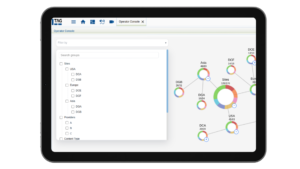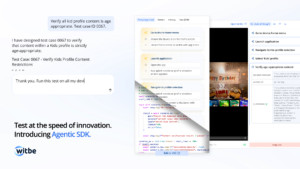
Sean King
SVP, General Manager, Commercial Enterprise, Veritone
The pandemic completely disrupted the entire content supply chain. On-site teams had to work remotely suddenly, events were canceled, and as a result, everyone scrambled to understand how to continue business as usual in this new environment. Many adapted, using cloud tools to keep their teams connected and collaborating.
But above all, it taught us that the old way of moving through content supply chains needs to be evolved to handle future disruptions and ensure we are positioned to capitalize on new revenue opportunities like the metaverse when they arise. To solve the inadequacies of today's supply chains, content creators and IP owners need to take a hard look at how they can incorporate artificial intelligence (AI) into their productions.

AI is a must-have for modern content supply chains
The past five years have made clear: AI is business-critical for organizations that want to stay relevant, agile, and healthy. According to PwC, over 50% of companies accelerated their AI adoption plans because of the COVID-19 crisis. In addition, ABI Research estimates that the media and entertainment industry will spend $16.5 billion by 2026 on AI and machine learning (ML). AI adoption in the broadcast world is gaining momentum as well, according to IBC.
But how exactly does AI apply to the content supply chain? Looking at the nine steps or phases identified in IABM’s BaM Content Chain®, AI is already playing in all areas. From a content creation perspective, synthetic voice technology, which uses AI and deep learning techniques to create voice clones, is gaining traction with voice talent and the audio world. Audio creators, from traditional radio to podcasters, brands, and TV and film producers, can start localizing content to enter new markets, opening new revenue and engagement opportunities.
With all the buzz around the metaverse, media and entertainment brands across categories have started planning or executing their content strategy for this growing space. For example, avatars, which are realistic 3D creations of individuals, are being leveraged to build digital personas for brands, influencers, celebrities, and athletes.

Podcast recording microphone in a studio
In this conversation, non-fungible tokens, or NFTs, also serve a purpose but don't necessarily use AI depending on the minting process and the selected blockchain. However, they are a vital content component that brands use to engage with consumers in the metaverse. AI will be foundational in supporting asset and IP management, data processing of digital interactions, and realistic audio and visual synthetic creations.
The BaM Content Chain processes of Produce, Manage and Publish all sit within a continuum that utilizes AI, especially when considering the management and distribution of live content. In the motorsport racing world, AI is already used from a broadcaster, partner, and racing team perspective. Live content can, in near-real time, be enriched with metadata so that it's organized effectively from the outset, accelerating distribution to the media and marketing teams that need this content to drive fan engagement.
AI will uncover new opportunities otherwise left unfound
The BaM Content Chain's last four phases (Consume, Connect, Store, and Support) are where things get exciting. While streamlining operations provides many net benefits, every road leads to revenue. And to uncover new opportunities also means understanding what's working and where innovation is needed. But first, let's talk about the monetization piece.
The benefits of leveraging AI on the supply chain's front end directly impact how well you can monetize your content. IP owners can establish their own licensing business using AI to tag content so that it's easily discoverable by end users, from documentary filmmakers to broadcasters to fans. While this requires content to be digitized, it enables content creators to leverage their entire archives rather than the assets they are aware of today. Older brands might be sitting on content they didn't know existed. Such was the case with Veritone client, the San Francisco Giants, who were able to use our AI solution to uncover footage to celebrate baseball legend Willie Mays that had been sitting on the shelf.
Revisiting content localization, most creators start in the English market because that's the largest. But by expanding outward into other regions, you can unlock new revenue opportunities. While CPMs will vary depending on the market, these are dollars digital audio creators are leaving on the table. Looking at just the English and Spanish markets, the opportunity is more than a 100% increase in potential ad revenue if you assume several factors such as number of downloads, average CPM, number of ads served, and number of newly created episodes per month.
AI also helps with Connect and Store when you consider how AI plays into creating automated workflows and processes across tools. From the consumption perspective, leveraging AI to process vast amounts of structured and unstructured data will offer new insights into how consumers engage and consume content. These insights will inevitably inform content creators about what types of content they should create, in what formats, and on what platforms.
Lastly, AI can support not only the automation of computing all content-centric data, but it can help ensure facilities are correctly planning and optimizing how they are using energy, which will only continue to become more of a priority as consumers care more about how companies are addressing their impact on the environment.

Woman interviewing man in radio show
Adopting AI doesn't have to be all at once
With AI touching the entire content supply chain, it can be overwhelming to figure out how to get started. The best place to start is one or two areas that are significant bottlenecks or pain points for you today. Once AI enters your content supply chain, you'll quickly notice other areas of the business where you can extend these capabilities, helping you scale as you need without feeling you need to make a costly investment up front.
One of the best parts of AI is that you do not need to necessarily rip and replace your existing technology stack but instead can add pieces to fill gaps or ingest AI into your current ecosystem. As a result, the technology lends itself to the flexibility of the business’s needs at any given time, helping companies adopt faster and make those incremental changes over time to harden operations for a future that's already knocking at the front door.









